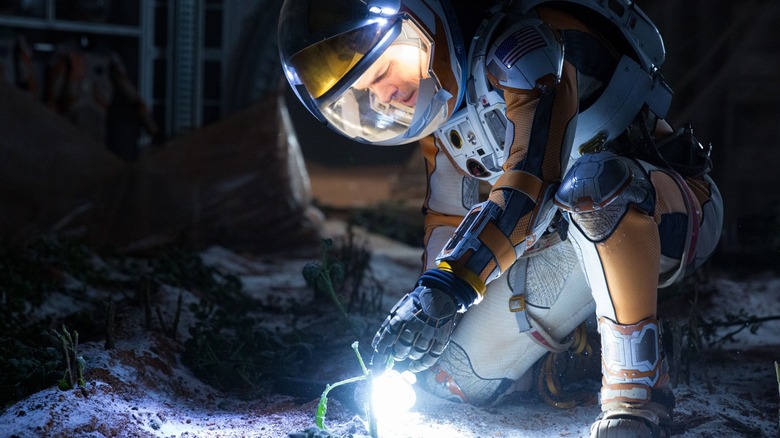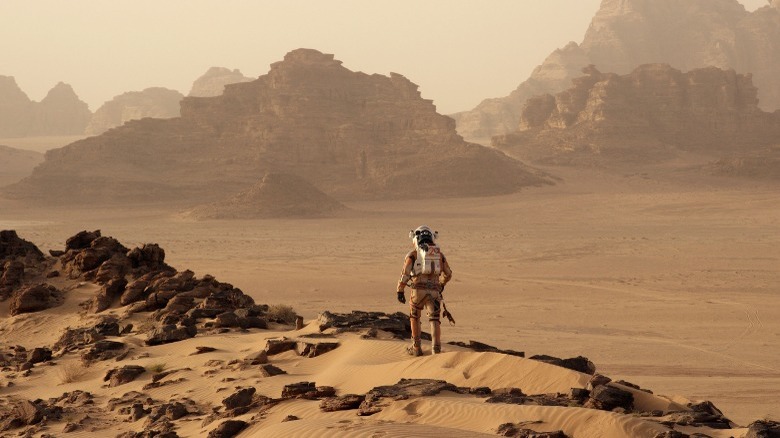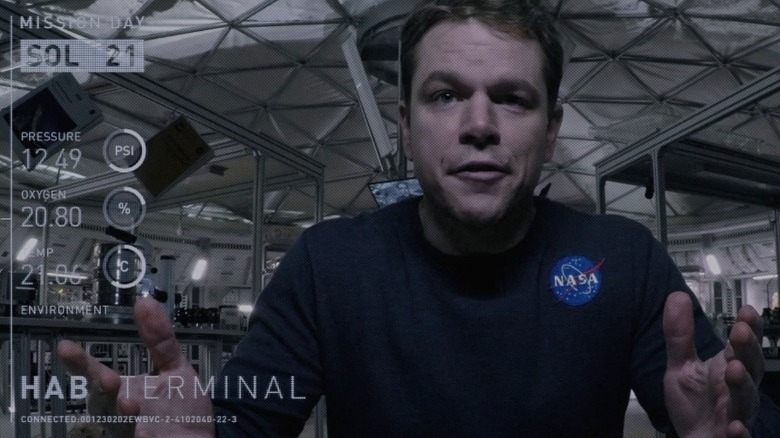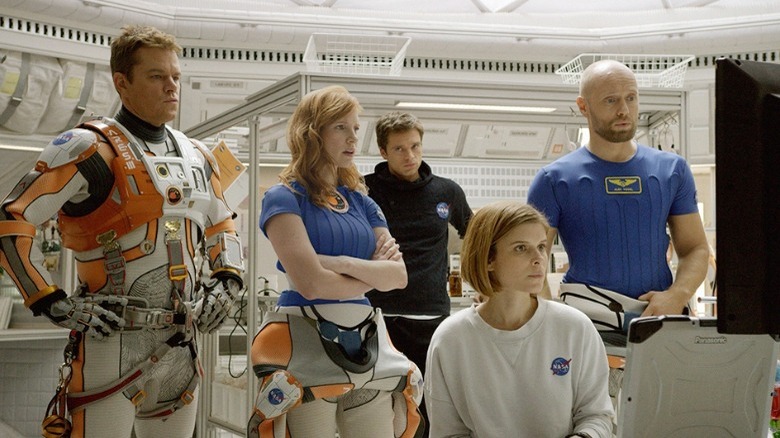The Martian Ending Explained: A Thrilling Survival Tale About Human Perseverance And Ingenuity
Everyone loves a good survival story. There is something innately satisfying about watching a protagonist push themselves toward the finish line despite all the odds stacked against them, and emerge stronger in the end. Ridley Scott encapsulates this exact feeling in his 2015 science-fiction thriller "The Martian," in which a lone astronaut stranded on Mars must rely on his scientific ingenuity to make it back to Earth. Unlike most of Scott's other sci-fi offerings, such as "Prometheus" and "Alien," which prompt broader metaphysical interpretations, "The Martian" is a straightforward tale about human persistence in the face of utter isolation and hopelessness.
In both Andy Weir's book "The Martian" and Scott's adaptation of the same, the scientific aspects of the story are not mere embellishments, but critical pieces of the central narrative. This raises the age-old tussle between scientific accuracy and making science-related stories accessible to a general audience. Scott solves this problem by striking an effortless balance between the two. For instance, Scott depicts the complex communication system that Mark Watney (Matt Damon) devises to signal NASA, but holds his characters back from getting too hung up on the jargon. As a result, the core intention behind this scene is established without folks having to necessarily understand what an ASCII Code or a hexadecimal system is.
Scott applies the same approach to the film's ending, which takes place amid tremendously high stakes with considerable room for error. Things inevitably go wrong, but Mark comes up with an insane idea to get back to the Hermes (the vessel orbiting around Mars which contains the rest of the crew) with the aid of teamwork and creative innovation. Let us look into the ending of "The Martian" and what it means for Mark's journey.
Stranded on an uninhabitable planet
During sol-18 of their 31-sol (sol = solar day) expedition, the crew of the Ares III face a sudden hitch in their mission. An intense dust storm takes place on Mars, threatening to damage their ascent vehicle, which prompts the crew to evacuate. Due to a stroke of bad luck, Mark is stuck in the debris and his suit is damaged, which leads his crew to assume that he's dead. Although grievously injured and on dwindling oxygen, Mark makes his way to the Hab (the crew's surface habitat) to do his best with limited resources. Mark immediately approaches the situation practically, coming to the conclusion that he needs to figure out a way to grow his own food until the next manned Mars mission (due in four years).
From an audience perspective, Mark is in a unique situation. The nature of his work puts him in an exceptional survival scenario that most of us cannot relate to. However, what makes Mark relatable and worth rooting for is his zeal to evade this impossible scenario — he uses his knowledge of botany to grow potatoes and uses filtered rocket fuel to quench his thirst. Anyone in his position would feel the pangs of isolation and hopelessness, and while Mark does struggle, he pours his optimism into his video logs, which act as his emotional anchor. The logs are evidence of his struggle — his need to survive — and they emerge as a hopeful grounding factor that helps Mark keep going.
There's much left to do, as Mark needs to find a way to reach the landing site for the next Ares mission. Only left with a few solar cells and an extra battery, Mark decides to establish contact with NASA. How hard could it be?
Why human communication is crucial for survival
The scene in which Mark is able to find the Pathfinder probe and get in touch with NASA using code exemplifies his anguished frustration, which the audience mirrors. NASA director of Mars Missions, Vincent Kapoor (Chiwetel Ejiofor) informs Mark that his crew is still unaware that he's alive (a decision made by Kapoor to not hamper the mission), which prompts Mark to write expletives that are broadcast worldwide. While his outburst is understandable, it highlights a failure in effective communication between the two parties, leading Mark to feel left behind despite his efforts to let the world know that he's alive.
Later in the film, effective communication works in Mark's favor when he connects cameras to devise a simple yes and no contact system with NASA. Working from a rudimentary response, the combined efforts of Mark and NASA executives allow them to devise a code-based system to send simple yet crucial messages such as "HOW ALIVE?" and "CROPS?" to better understand Mark's situation. This development not only bolsters Mark's hope but prompts NASA to take practical steps to help him out, such as the involvement of astrodynamicist Rich Purnell (Donald Glover), who devises an unconventional way of rescuing Mark.
Also, it is communication with the Hermes crew that allows for the rescue plan to unfold, as they feel immense guilt that one of their own has been accidentally left behind on Mars. Despite pushback from NASA higher-ups, the crew unanimously decide to rescue Mark and gear up for their trip back, while the world watches in anticipation. This sense of unconditional camaraderie heightens the dramatic nature of Mark's circumstances, as it is endearing to see the crew defy administrative orders and circle back to rescue their friend.
Human ingenuity saves the day
One of the reasons why "The Martian" resonates with audiences is the realistic way in which Mark's arc unfolds. The odds stacked against him are monumental, and his optimism wanes as years pass. He is no longer the indomitably strong-willed botanist we know — the ordeal has left a mark on him. Despite these dire circumstances, there is something essentially life-affirming about Mark's journey. Although his video logs become more hopeless/depressing, he continues to work on the rover. Even when in the gutter, Mark Watney refuses to give up and dares to hope while gazing at the stars.
The climactic rescue is rife with problems, as Mark and his ascent vehicle need to be lightweight enough to achieve enough velocity to rendezvous with the Hermes. Commander Lewis (Jessica Chastain) uses an explosive to slow their craft down and reach Mark, but the attempt fails. Just as all hope seems lost, Mark does the unthinkable: he punctures a hole in his suit to use it as a propeller toward Lewis. The plan works, and the catharsis attached to this moment is immense, as Mark's laborious struggle finally pays off.
In the end, Mark decides to become an instructor for aspiring astronauts, and his tale of survival becomes a principal guide for the next generation. Mark emphasizes the importance of perseverance, as luck can only take one so far. The ending also touches on the lives of the rest of the crew — while this is a neat, gift-wrapped ending, it works fairly well with the overarching themes of the story. All is well in the end, and as unrealistic as that might sound, this happy ending is thoroughly earned in "The Martian." After all, it is a literal leap of faith that saves Mark's life in the end.



